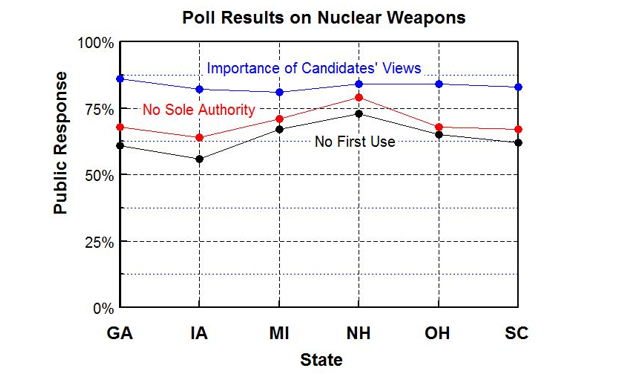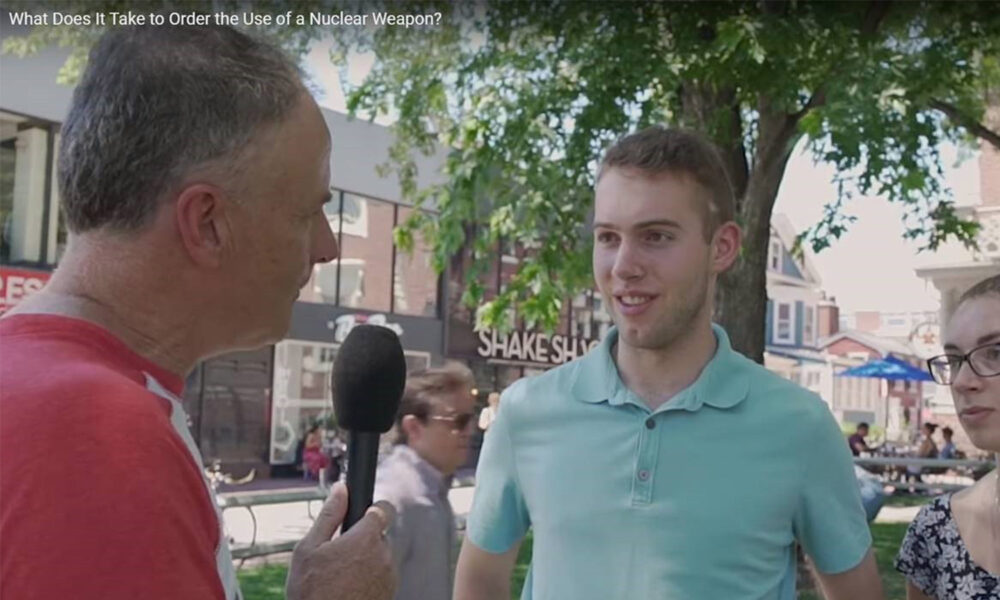Last year, I spent a couple of hours at a park in Cambridge, Mass asking passers-by who they thought was involved and had the authority to launch US nuclear weapons. Not surprisingly, most people incorrectly assumed that “Congress,” the “military,” the “Joint Chiefs of Staff” or “the experts” had some say. And when they learned that under current policy, the US president has sole decision-making authority over nuclear weapons their responses included “spooky,” “worried” and “not good.” Not good, indeed.
Just last month, my colleague Sam Tardiff was in New Hampshire asking voters if they knew how many nuclear weapons there are in the world and how much the US spends on nuclear weapons. Again, most folks really had no idea. On the number of weapons, the answers ranged from “maybe 10 or 20” to “500” to “100,000.” When we revealed how many actually exist – around 14,000 – and how much the US plans to spend to maintain and rebuild its entire arsenal – nearly $4 million every hour, every day for the next 30 years – people were shocked and outraged. My favorite response: “Dude, dude, why can’t we like have cheaper text books or doctors for free? Dude, we already have so many weapons to kill so many people.”
To be fair, people can be forgiven for not knowing (or wanting to know) much about nuclear weapons. It’s pretty daunting thinking too much about the most destructive, humanity-threatening weapons ever invented. (I should know, since I’ve been doing it for 30 years.) And as we learned, many people get pretty ticked off and worried when they are told about our current absurd and dangerous policies and the grotesque amount of money we spend on these planet killers.
Moreover, even in the endless series of campaign speeches and debates during a presidential election year, few candidates or press stories talk about these issues.
But we know that voters across the country want nuclear policies to change AND they want presidential candidates to be laying out their positions. Over the last year, UCS commissioned polls in NH, IA, MI, OH, GA and SC asking the three same questions:
- In your opinion, are there any acceptable circumstances for the United States to use nuclear weapons first in a conflict or should the United States only use them after a nuclear attack on the United States or one of our allies?
- How important is it to you for candidates in the upcoming 2020 presidential election to lay out their views regarding nuclear weapons?
- Currently, the president can order the use of nuclear weapons on his or her own and the decision cannot be overruled. Are you comfortable with this policy or would you prefer that one or two other senior government officials be required to approve the use of nuclear weapons?
What the polls revealed
The answers were surprisingly consistent from state to state.
In all states, a strong majority said the United States should never use nuclear weapons first. What really stood out from state-to-state is that 4 out of 5 voters, regardless of age, gender, political party, race, or faith think it is important for the candidates to “lay out their views regarding nuclear weapons.” And our friends at the Nuclear Threat Initiative found very similar results from a January, 2020 poll they commissioned.

Fig. 1: This figure summarizes the results of the state polls UCS commissioned on nuclear weapons issues. The blue dots show the percentage of respondents who thought it is “very” or “somewhat” important that presidential candidates lay out their views on nuclear weapons. The red dots show the percentage who believe the president should not have sole authority to order a nuclear launch. The black dots show the percentage who believe the United States should not use nuclear weapons first, or at all, in a conflict. Source: UCS
So, are the presidential candidates talking about nuclear weapons? Hardly. To date, there have been eight presidential debates since the 2020 campaign kicked off and there has been exactly one question asked specifically about U.S. nuclear weapons policy. That occurred in last July’s Democratic Party debate in Detroit when Jake Tapper of CNN asked the candidates about a nuclear no-first-use policy.
Absurd, right? Like climate change, nuclear weapons pose an existential threat to humanity. A threat that is growing more urgent every day—with the United States walking away from critical nuclear arms control agreements and nuclear weapons states embarking on a new global nuclear arms race. Voters want to know how candidates will address this threat, but none of the candidates talk about the issue on the campaign trail.
What concerned voters can do
So what’s a concerned voter to do? Start by signing our Open Letter to 2020 Presidential Candidates: Make Preventing Nuclear War a Priority. Ask the candidates directly. Track them down. Attend candidate events. Stand in selfie lines. And that’s exactly what scores of folks have done over the last year, particularly in New Hampshire with its rich history of voters interacting directly with the candidates in the first in the nation primary. With UCS’s help, those questions are being asked, they’re being filmed and compiled in a growing 50+ video library of candidate interactions.
Want to know where the candidates stand on no first use? Hair trigger alert? Nuclear weapons spending? Primary season is in full swing. But the general election is nine months away. Still plenty of time to badger, cajole, demand, urge each and every candidate to take this issue very seriously and publicly tell us what they plan to do—if elected—to make us safe and make sure that what happened 75 years ago never happens again.
The featured image in this blog is courtesy UCS.

